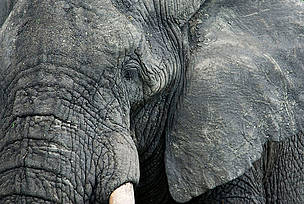US President Barack Obama makes pledge to tackle wildlife crime during Africa visit
Posted on July, 01 2013
Obama announces US support for combating poaching and wildlife trafficking during visit to Africa.
WWF today praised US President Barack Obama for announcing major new steps to help combat wildlife trafficking and the global crime syndicates that are driving the illicit trade, including the development of a presidential task force on wildlife trafficking and $10 million in critical new support for regional and bilateral training and technical assistance in Africa to combat wildlife trafficking. During a state visit to Tanzania on Monday, President Obama said “poaching and trafficking is threatening Africa's wildlife.” The executive order outlined that poaching operations have expanded beyond small-scale, opportunistic actions to coordinated slaughter commissioned by armed and organized criminal syndicates. The survival of protected wildlife species such as elephants, rhinos, and other critical species has beneficial economic, social, and environmental impacts that are important to all nations, according to the White House.
President Obama announced significant new efforts by the US government to fight the problem, including the creation of a high-level interagency task force – a presidential task force on wildlife trafficking – led by Interior, State, and Justice Department leadership, as well the establishment of an external advisory council on wildlife trafficking. President Obama directed the task force to develop a national strategy within six months to fight wildlife trafficking and to consider how the US transnational organized crime strategy can be used to combat the issue, as it does other serious crimes like human trafficking and arms trafficking. The focus of the task force will be on anti-poaching, regional law enforcement, law enforcement mechanisms, and reducing illicit trade and demand. The president also noted that the challenge does not reside within Africa alone, that the US must “seek to reduce the demand for illegally traded wildlife, both at home and abroad, while allowing legal and legitimate commerce involving wildlife.”
"The planet’s most majestic species are being massacred for nothing nobler than vacation trinkets, hangover remedies and false promises of miracle cancer cures,” said Carter Roberts, President and CEO of WWF-US. “These syndicates are robbing Africa of its wealth. President Obama’s commitment to help stop the global crime wave that is emptying the continent’s forests and savannas is welcome news. It gives a critical boost for everyone involved in fighting wildlife trafficking – from rangers on the ground to local conservation groups to decision-makers around the globe. The future of our wild world rests in our hands, and now we must move with all due speed to make sure elephants, rhinos and other extraordinary creatures don’t disappear forever.”
Countries like Tanzania and other African countries are losing their natural resources – and the lives of rangers and law enforcement personnel – on a scale that requires international intervention. The United Nations has formally recognized that money from trafficking in ivory is funding groups in Africa linked to terrorist organizations, and both former US Secretary of State Hillary Clinton and current US Secretary of State John Kerry have identified the issue as a priority, given the poaching crisis in Africa. The president of Gabon, the president of the African Development Bank, the UK government and the prime minister of Thailand have all made strong commitments to fight wildlife trafficking in the past year as well.
As part of a global campaign to promote international solutions to stop wildlife trafficking, WWF is calling on all governments – and particularly those of demand countries such as China, Vietnam, Thailand and the United States – to strengthen their response to the issue and clamp down on illicit trading networks.







